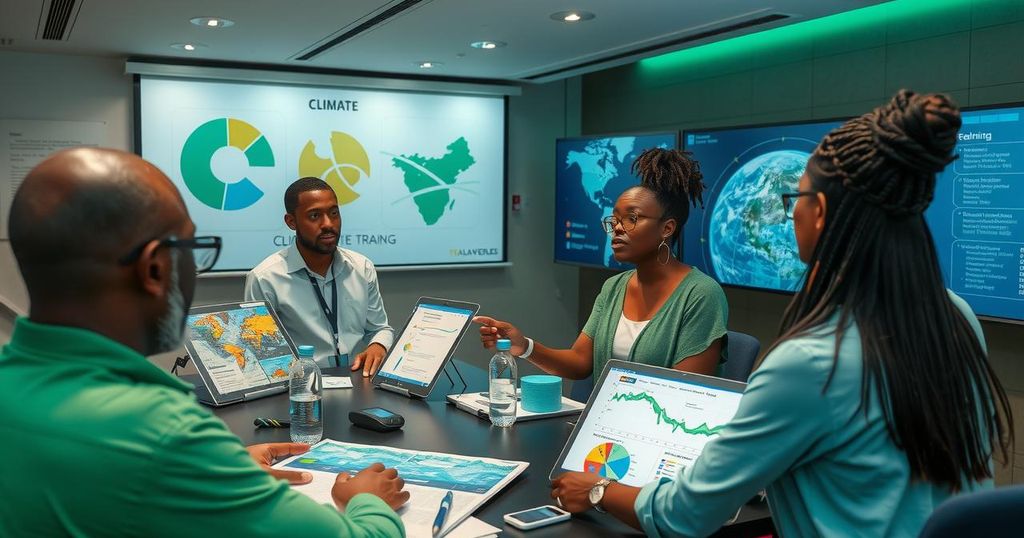Hurricane Milton struck Florida as a weakened storm, but its impacts have highlighted the increasing frequency of extreme weather linked to climate change. Despite extensive evacuation and preparedness efforts, political leadership in the state often fails to acknowledge the human role in global warming. The denial of climate change among significant political figures intensifies the urgency for effective policies that address both immediate disaster management and the root causes of extreme weather.
The response to Hurricane Milton, which approached Florida as a category 3 hurricane on Wednesday night, has underscored the state’s precarious situation as it faces increasingly frequent severe weather events. With extensive preparations in place, including evacuations and the activation of thousands of National Guard troops and FEMA personnel, the impact of Hurricane Milton could have been catastrophic had it not lost some strength before landfall. This event follows closely after Hurricane Helene, which resulted in substantial loss of life, claiming at least 225 victims within the United States. Recent analyses indicate that the escalating ocean temperatures, significantly worsened by human-induced climate change, are considerably amplifying the severity of such storms. Research suggests that the rainfall associated with Hurricane Helene might have increased by up to 50% due to global warming, indicating a disturbing trend where extreme weather could become a frequent occurrence every three years as long as fossil fuel consumption remains unchecked. The situation in Florida illustrates a stark contrast between the urgent necessity to manage the immediate aftermath of these storms and the reluctance among certain political leaders to confront the underlying causes of climate change. Despite the evident threat posed by rising temperatures, Florida’s leadership, including Governor Ron DeSantis, demonstrates a troubling juxtaposition of acknowledging the consequences while denying the root causes of these phenomena. While DeSantis has correctly anticipated the destructive potential of Milton, he simultaneously promotes fossil fuel interests and has taken steps that undermine renewable energy initiatives. The stance of former President Donald Trump, who has previously dismissed climate change as a “hoax,” poses significant risks should he return to power. His administration could exacerbate the climate crisis by pledging to withdraw the US from international climate accords and dismantling clean energy programs. Furthermore, bipartisan discussions surrounding climate change often find the Republican Party resistant to even acknowledging the problem, leading to conspiracy theories rather than constructive action. Conversely, while the Democratic Party has recognized the pressing need for climate intervention, the measures taken thus far remain inadequate. Even with a recognition of the climate crisis, the supported initiatives continue to lean towards expanding fossil fuel production rather than transitioning to sustainable alternatives, which is disconcerting for voters concerned about environmental sustainability. In light of these dynamics, it is imperative that voters consider the implications of climate policies as they approach the polls. The ramifications of continued denial and inaction regarding human contributions to climate change may very well endanger future generations as the frequency and severity of climate-related disasters escalate.
Hurricanes have become increasingly destructive as climate change intensifies their effects. The article focuses on Hurricane Milton’s impact on Florida and the preparations made to mitigate the disaster’s consequences. It outlines a pattern of political leaders responding to immediate crises without addressing the environmental factors contributing to these disasters, specifically pointing to the correlation between human activity, global warming, and extreme weather events. The narrative traces the political landscape of climate change denial, particularly among Florida’s Republican leadership, while acknowledging the Democratic response, albeit critically.
Hurricane Milton’s recent impact on Florida illustrates the growing threat of extreme weather driven by climate change, exacerbated by a political landscape rife with denial. While immediate preparations and responses are crucial, it is vital for leadership to confront the causes of these crises. Voters must be conscious of the long-term implications of climate policy when making electoral decisions, particularly regarding candidates who either deny or inadequately address the pressing issue of climate change, as this has direct consequences for public safety and environmental health.
Original Source: www.theguardian.com




